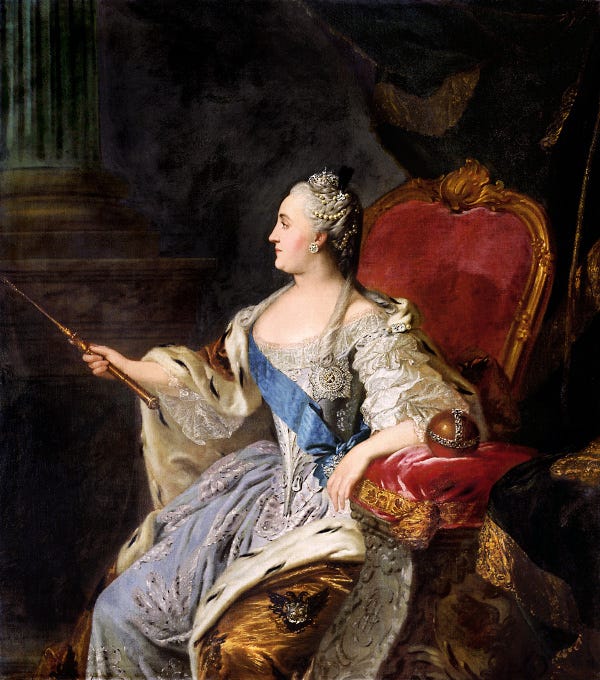Portrait of a Lady Autocrat
Book Signing and Talk: Robert Massie
Author of Catherine the Great: Portrait of a Woman
Oct. 17th at 6:00 PM in Whig Hall
Free admission

Robert K. Massie was keen to tell us that despite the perception of most folks who have heard of the Russian monarch, Catherine the Great was in fact not a nymphomaniac. That image was instead a result of entrenched male privilege.
“Louis XV maintained a pleasure resort of nubile girls at Parc-aux-Cerfs, and to say nothing of the Ottoman sultan’s harem of over three hundred women,” says Robert K. Massie from the podium of Whig’s auditorium. Over the course of her 67-year life, Catherine only had twelve lovers, who provided companionship and satisfied her need to feel youthful and desirable. So much for equality before the court of popular history.
Mr. Massie, the Pulitzer-Prize winning Romanov historian, was here promoting his new book, Catherine the Great: Portrait of a Woman. In that hefty volume he sets out to dispel precisely those kinds of scurrilous tales discrediting the last female ruler of Russia — and replace them with an intimate, humanizing, and highly protagonistic account of the Empress as a woman, as a ruler, and as a catalyzing force in the Russian Enlightenment.
While some political historians contend that enlightened despotism was merely a form of good public relations branding, Mr. Massie seems to genuinely believe that Catherine was a civilizing force for 18th century Russia. He points to the Empress’s intellectual relationship with Diderot, her generous purchase and donation of Voltaire’s library to raise funds for the philosopher’s daughter, and her art collection, which formed the basis for the Hermitage. On the other hand, he blamed Catherine’s serfdom policy, which deprived the lower classes of even more rights than before, and the incompetent suppression of the Cossack Rebellion on pressures from the aristocracy and local administration. Discerning students of history may recall Catherine’s 1785 statute declaring Jews as non-citizens, or her role in the partition of the Polish-Lithuanian Commonwealth of her former lover Stanisław Poniatowski — both of these are anything but enlightened. “Enlightenment,” it must not be forgotten, at least when it came to the rule of the autocrats, was merely a positive contrast to the vast majority of decidedly unenlightened despotism going on at the time.
But Mr. Massie would have us believe that “her life was the ultimate success story,” one where a poor and no-name German princess would travel to Russia, survive an unsatisfying marriage, and go on to become the most powerful woman in the world. It’s a compelling narrative, and quite an autobiographical one, too, with a good deal of the first parts of the book are taken directly from Catherine’s diaries, which Mr. Massie is fond of quoting liberally. It’s a portrait of resilience and self-reliance, of an intelligent woman who would for centuries haunted by the clouds of skepticism due to her sex. Perhaps it’s a much needed narrative, when so much political discourse is plagued by anti-elitist sentiment, to remember that there was a time when being well-read, erudite, and enlightened was considered very good PR.